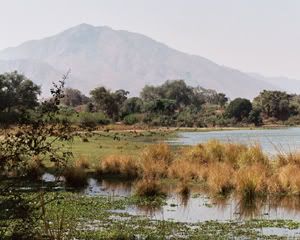I never thought I would utter words of praise for George W. Bush, but I have to give him credit for accomplishing something positive. His support for initiatives to battle HIV/AIDS and malaria in Africa have actually made a difference in the lives of millions of people.
While in Uganda researching Heart of Diamonds, I met a British doctor who ran a small clinic near Bwindi. His facilities were primitive by our standards (a hand-cranked centrifuge!) and he counted the local traditional healer as an ally, but he stated unequivocally that the Bush initiatives were both well-intentioned and well-executed.
Distribution of antiviral drugs and equipping and building new clinics to treat AIDS patients is not only fighting the disease, but laying the groundwork for longer-term positive changes in many societies as well. As fewer children die from AIDS, for example, African families can be induced to have smaller families, which in turn makes it possible to invest more in the education and nutrition of each individual child.
The fight against malaria, though, may actually be more important. Malaria takes a million lives a year in Africa—and debilitates millions more. The simple distribution of insecticide-laden sleeping nets, if continued, can actually eradicate the disease completely! The parasite that causes the infection reproduces in human red blood cells—and gets there only by a bite from a female Anopheles mosquito. Stop the bites, and the parasite can’t reproduce. Stop enough bites, and it may die out.
Nets cost a few dollars, which is still beyond the means of many Africans. That’s where Bush’s support has made a difference. Millions of nets have been distributed at reduced prices (manufactured in Africa, too, which creates jobs), and millions more are slated to be handed out. According to some experts, malaria could be eradicated as early as 2012.
Dave Donelson, author of Heart of Diamonds
Tags: romantic thriller, Congo, blood diamonds








